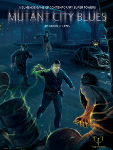Robin D. Laws's Blog, page 92
November 27, 2011
Dragon Met, Despite Planned Service Disruptions
 LONDON — Never mind local authorities' scheme to add a puzzling extra dimension to Ken and Robin's tube journey to Kensington High Street with a shutdown of the Circle line. Once more we triumphantly descended upon Kensington Town Hall to chat, sign autographs, and generally hold court. Dragonmeet is an event that bubbles along nicely at its maximum current capacity. It could perhaps grow by renting a bigger facility—or for that matter, more space in its present venue—but this is central London we're talking, so that's prohibitively expensive. Keeping the participation at about 600 attendees lends it a sense of a comfy reassembly of the tribe. I saw many familiar faces and in certain instances successfully connected them to their familiar names.
LONDON — Never mind local authorities' scheme to add a puzzling extra dimension to Ken and Robin's tube journey to Kensington High Street with a shutdown of the Circle line. Once more we triumphantly descended upon Kensington Town Hall to chat, sign autographs, and generally hold court. Dragonmeet is an event that bubbles along nicely at its maximum current capacity. It could perhaps grow by renting a bigger facility—or for that matter, more space in its present venue—but this is central London we're talking, so that's prohibitively expensive. Keeping the participation at about 600 attendees lends it a sense of a comfy reassembly of the tribe. I saw many familiar faces and in certain instances successfully connected them to their familiar names.
Speaking of facility limits, I took part in only one panel this year, a Q&A formatted round-up of all matters Pelgrane. I talked DramaSystem, the potential pitfalls of a GUMSHOE compendium, and how to get your players to key into investigative spends. Simon tantalized the crowd with two potential blockbuster Trail of Cthulhu supplements from Ken. Both aroused palpable booklust, with Pulp China scoring a clear edge over Southern Gothic. Assuming that Paul of Cthulhu's sacrifices to the audio gods were all in good order, a recording of this talk should become available in the proper fullness of time.
As always, Dragonmeeters, it was a pleasure to catch up with you, and I hope for the continuance of this developing tradition.
November 26, 2011
A Clan Gathered For Conquest
 LONDON – Last night there was feasting, both by the hard-bitten peoples of the craggy Southlands, and by the assembled Pelgranistas playing them in a rousing game of Hillfolk. One group got more sticky toffee pudding than the other.
LONDON – Last night there was feasting, both by the hard-bitten peoples of the craggy Southlands, and by the assembled Pelgranistas playing them in a rousing game of Hillfolk. One group got more sticky toffee pudding than the other.
This was my first time grappling with the one-shot format for the game, which in general is tuned for extended play. I wondered how much intervention on my part would be required to make it work in this format and decided to play it by ear. As is its wont, the game subtly did our work for us, creating a dynamic that escalated naturally into a climactic struggle over clan leadership. The session will help enormously in writing the convention run section of the final rule book. It also has me thinking that the way the current manuscript suggests kicking off the series is too interventionist, and that the players may be better left to their own devices.
Speaking of which, it's time to navigate a partially closed tube system on an eerily balmy late November London weekend, and hie ourselves to Dragonmeet. Looking forward to a fine gathering of another wild clan—though perhaps without quite so much iron age sturm und drang.
November 24, 2011
The Birds: City Planning
Click here for the complete strip archive.
Stuck in mobile mode? Click here for image file.
November 23, 2011
Premise Concealment and the Overvaluation of Secrecy
 D&D's status as the progenitor of roleplaying as we know it has sometimes led RPGers to overvalue certain of its elements. Or rather, to adopt in their entirety bits that absolutely apply to the core activity of D&D but don't automatically translate to all others.
D&D's status as the progenitor of roleplaying as we know it has sometimes led RPGers to overvalue certain of its elements. Or rather, to adopt in their entirety bits that absolutely apply to the core activity of D&D but don't automatically translate to all others.
For example, the baseline assumption has always been that you roll to see if you get information because that works really well in a game where you're going down into dungeons, killing monsters, and taking their stuff. Should you fail to detect a secret door, you can always find another door to bash down instead. If you don't find the treasure hidden in the hollow in the portico, them's the breaks.
This assumption doesn't carry over into a game where the core activity is solving a mystery of whatever stripe. It leads to the bottlenecks and workarounds GUMSHOE was designed to eliminate.
Secrecy in general works splendidly in D&D. In the old school days, you had the mystique of the map, which the GM has hidden in front of them, and which the players must painstakingly strive to replicate. The physical process of making the map marks the group's collective progress in killing the monsters and taking their stuff. The world in general is a giant question mark, which you whittle away at by exploring.
This has led us to overvalue secrecy in general. One extreme manifestation comes with the campaign that withholds even its premise from the group. The GM tells you only to create modern-day, more or less ordinary characters. When you show up to play, you learn, as your characters discover their true situation, what the core activity of the game is.
If you have fun running or playing under this set-up, I'm sure not going to tell you that you're not. However, you might want to ask yourself how much of that fun occurs due to this arrangement, and how much comes in spite of it.
First, let's face it. Once you've been around the block, the surprise isn't so surprising anymore. Your players know the premise, mostly. They're almost invariably signing up for a survival horror game—perhaps with aliens, fellow survivors or mundane soldiers in place of the default supernatural entities. If not, you're playing a superhero game in which they all develop powers during the first sessions. Even when players are truly surprised, the benefit lasts only for a chunk of the first session, while the costs linger for the remainder of the series.
Second, by separating the core activity from character creation, this style of play reduces collaboration and shifts the narrative burden onto the GM. The GM must keep the plot machinery constantly turning to keep his random cast of PCs engaged, rather than inviting players to suggest their own compelling, personal reasons to take part in the core activity. For a dominant GM and passive players, the withheld premise may work out fine. With one or more resistant/defensive players, you'll get turtling. When you're lucky, active players improvise connections to the core activity on the fly, back-engineering the decisions they would have made when conceiving their characters. Otherwise they may discover that their PCs frustrate them, leading them to ditch them in favor of replacements tailored for the now-revealed campaign premise.
November 22, 2011
Back To Browning
 Unless they're also paying attention to what's being marketed to the art house crowd, fans of horror cinema may not have Pedro Almodovar's latest, The Skin I Live In, on their radar screens. Nonetheless, you may see no film more deeply steeped in the horror tradition this year. Almodovar has in the past channeled such filmmakers as Douglas Sirk and George Cukor. Here he goes to the well of Tod Browning for a tale of obsession, madness, and body distortion. Insane scientist Antonio Banderas, abetted by his suspiciously loyal maid, keeps captive the beautiful subject of a forbidden medical experiment. If you doubt the Browning connection, Exhibit A is the fact that he wanted to shoot the film as a black and white silent. Exhibit B is the secondary villain who shows up wearing a tiger costume.
Unless they're also paying attention to what's being marketed to the art house crowd, fans of horror cinema may not have Pedro Almodovar's latest, The Skin I Live In, on their radar screens. Nonetheless, you may see no film more deeply steeped in the horror tradition this year. Almodovar has in the past channeled such filmmakers as Douglas Sirk and George Cukor. Here he goes to the well of Tod Browning for a tale of obsession, madness, and body distortion. Insane scientist Antonio Banderas, abetted by his suspiciously loyal maid, keeps captive the beautiful subject of a forbidden medical experiment. If you doubt the Browning connection, Exhibit A is the fact that he wanted to shoot the film as a black and white silent. Exhibit B is the secondary villain who shows up wearing a tiger costume.
In North America Almodovar is sometimes seen as as a lighter filmmaker than he is, because we embrace his sunniest works, like Volver and Woman on the Verge of a Nervous Breakdown. Most of his films take a darker tone and take place in a world where passion spills over into sexual menace. His 1986 film Matador, for example, plays as the giallo Luis Buñuel might have imagined.
The Skin I Live In is a compelling exercise in the outre and highly recommended to film-going horroristas.
November 21, 2011
Beer Knowledge Me (London Edition)
 As previously and thrillingly recounted in these blog pages, I recently underwent a hopsy conversion on the road to somewhere or other and now find myself a liker of beer.
As previously and thrillingly recounted in these blog pages, I recently underwent a hopsy conversion on the road to somewhere or other and now find myself a liker of beer.
As likewise announced, this weekend I will once again be jetting to the reserved yet splendid embrace of London, England, for the Dragonmeet convention and related Pelgrane summitry.
A visit to the Pelgrane's nest largely concerns itself with the free flow of wine, a tradition with which one would be a fool to tamper. But let's say, for the sake of hypotheticality, that I at some point wind up in a pub. You also, by remarkable coincidence, happen to be in this fine establishment and are either an English enjoyer of beers or an enjoyer of English beers.
If I'm having what you're having, what am I having?
November 18, 2011
The Birds: Category
November 17, 2011
The Three Reveals of Gen Con Meet the Three Updates of November
 Hey, Robin, you may be asking, what's up with those three projects you announced in August? Here's a progress report. All are looking more winter '11-'12 than fall '11 at this point. In an event unparalleled in human history, it has transpired that certain elements of a project take longer than initially thought.
Hey, Robin, you may be asking, what's up with those three projects you announced in August? Here's a progress report. All are looking more winter '11-'12 than fall '11 at this point. In an event unparalleled in human history, it has transpired that certain elements of a project take longer than initially thought.
I've been talking about Hillfolk / DramaSystem a lot in these blog pages. The manuscript is now in great shape for outside playtest. Given the upcoming Christmas rush, it may make more sense to punt this to 2012. Simon Rogers and I have been discussing, and will soon be revealing our crowdfunding approach.
Kenneth Hite has kindly agreed to write the foreword to my book of King in Yellow-inspired fiction, New Tales of the Yellow Sign. The project awaits the moment when he can squeeze this valued and volunteered effort into his fraught schedule.
Speaking of matters Hitean, the third item, the "Ken and Robin Talk About Stuff" podcast, awaits the design of a companion site. We have lovely illustrations in hand from a certain acclaimed and Muskrat-adjacent cartoonist, and a rough sketch of how we want it to look.
So all are still moving ahead. I'll keep you apprised on each as developments develop.
November 16, 2011
Deceit and DramaSystem
 Commenter Carl, over at my See P. XX intro to DramaSystem, asks about the role deceit plays in the game. Is there a mechanism to ensure that characters who are deceived act accordingly?
Commenter Carl, over at my See P. XX intro to DramaSystem, asks about the role deceit plays in the game. Is there a mechanism to ensure that characters who are deceived act accordingly?
It depends on whether the interaction is procedural or dramatic. In the first instance, it occurs in pursuit of a pragmatic goal, free of emotional content, with a minor, GM-run character we don't much care about. In this case you can con the character and he'll act as if conned.
In general deceit occurs in DramaSystem because the core interactions mimic drama in fiction, which in turn is a condensed version of the way we behave toward one another in real life. One person seeks an emotional payoff from another, and in the process may choose to lie, dissemble, or hoodwink. If you're playing a dramatic scene, you can make the choice to act as if the character is deceived, or not. Unlike Skulduggery / Dying Earth, the system does not force you to be fooled. This is because the character who acts on false information belongs more to the melodrama than the drama. Drama is about choices; deceit robs characters of true choices. Deceived characters work in drama when they are, perhaps subconsciously, choosing to be lied to. When Lear buys Regan and Goneril's flattery and rejects Cordelia's frankness, he is, on one level, fooled. But really he's allowing himself to be gulled, because he's petitioning them for ego gratification and wants to get it. In the DramaSystem version of this scene, Lear's player decides to act as if fooled—he isn't required to do it by a die roll.
If deception belongs to melodrama, its equivalent in drama is self-deception.
November 15, 2011
A Shout-Out (With Errata)
 The gang at the Pulp Gamer podcast tackle Mutant City Blues, GUMSHOE and much more in episode 192. Jason dropped the linked, explicable super powers of the default game setting in favor of the Marvel universe's jam-packed cavalcade of weirdness, and still got the premise to work.
The gang at the Pulp Gamer podcast tackle Mutant City Blues, GUMSHOE and much more in episode 192. Jason dropped the linked, explicable super powers of the default game setting in favor of the Marvel universe's jam-packed cavalcade of weirdness, and still got the premise to work.
As I point you to the episode, I do have to pipe up with a small correction. There's a touch of mis-speaking in the segment, giving the impression that you have to pay investigative points to get core clues in GUMSHOE. Readers familiar with the game already know that investigative point spends only occur to get cool but tangential information or other tangible benefits. Core clues are always available without a spend, fulfilling the game's purpose of eliminating investigative logjams.




